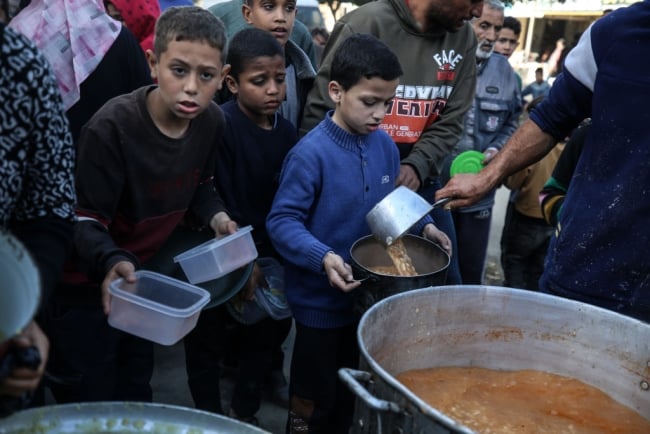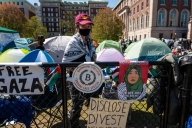You have /5 articles left.
Sign up for a free account or log in.

Displaced Palestinians collect food aid donated by a charity in Deir al-Balah, Gaza, on Friday, March 22.
I have been a college president for more than 20 years, and during that time I have occasionally spoken out about world events that intersect with a commitment to education. When Boko Haram terrorists kidnapped hundreds of school girls in Nigeria, I wrote about the ways in which education threatens authoritarian movements. A few years later, I wrote about threats to academic freedom, notably the Hungarian government’s campaign to expel the Central European University. And I have commented on terrorism both here in the United States and around the world. On Oct. 7, 2023, I wrote about the “sickening violence” of the Hamas attacks on Israelis, and since then I have worked with all constituencies on my campus to try to come to grips with the ensuing war in the Middle East. Faculty and staff, students and alumni, have rightly expressed horror and anger as the civilian death toll in Gaza has increased. Israeli bombardments and continued battling by Hamas from inside hospitals, schools and tunnels are decimating the entire infrastructure for creating basic living conditions. It is a catastrophe.
Last week, I sent letters to Connecticut Senators Richard Blumenthal and Chris Murphy asking them to redouble their efforts to bring peace to the Middle East and humanitarian aid to Gaza. The Oct. 7 attacks unleashed a brutal war, and Palestinian civilians have borne the brunt of Israel’s military campaign. The fact that the intensity of Israel’s response was surely anticipated by Hamas is no consolation to the innocent men, women and children in Gaza who continue to suffer this all-but-unimaginable disaster. As Israel’s principal supporter, the United States has had a crucial role in the war, and now we must have an equally forceful role in the push for peace—a sustainable peace that recognizes the rights of all parties.
I asked my senators to take every opportunity to urge the Biden administration to ensure an immediate cease-fire so that humanitarian aid can reach Palestinians. I know that many people in my university community, and across the nation, are eager to send assistance to the region. Almost every school and every university in Gaza has been destroyed or seriously degraded. Where once people studied, now they starve. Our representatives in Washington should do everything they can to facilitate the delivery of humanitarian aid and to share information about how Americans can help. Only with a cease-fire can we begin to address the catastrophe.
The war in Gaza has brought out the best and worst impulses on campuses in America. At many colleges, students and faculty have organized thoughtful study groups, lectures and seminars to explore the roots of the conflict and the possibilities for peace. These activities, though, have not been deemed especially newsworthy. Instead, we see reports of campus conflict—the resurgence of prejudice and even violence. In some areas, Muslim students are afraid to venture off campus as Islamophobia is stoked by demagogues with large followings and by violent individuals agitated by religious difference. At the same time, antisemitism has surged on campuses, and it now seems permissible to some self-styled progressives to attack Jews under the guise of anti-colonial activism.
Yes, these incidents of hate on college campuses are appalling, but they should not distract us from the most important task right now: getting aid to Palestinians in Gaza while there is still time to save lives. In an emergency, we should not be distracted by the noise around us, however jarring. Across the state and the nation—indeed, across my own campus—there are many different opinions about what a durable, just peace would look like in the Middle East. I’ll leave that discussion to the experts; what is clear now is that we have an obligation to do everything we can to relieve the profound suffering in Gaza. I’ve asked my representatives in Washington to take the lead in ensuring that this phase of violence unleashed by Hamas on Oct. 7 doesn’t continue to wreak havoc in the region.
In the last few months, many pundits across the land have urged leaders of colleges and universities to “stick to their knitting”—that is, cultivate institutional neutrality. “Inevitably, staking any position weakens the public’s perception of the university as independent,” writes Pamela Paul. Instead of participating in debates, leaders should keep silent, which somehow is supposed to encourage more thoughtful speech from others. But almost all colleges and universities have mission statements with moral commitments, and the fact that leaders of these institutions cannot possibly comment on everything does not mean they should comment on nothing. Silence at a time of humanitarian catastrophe isn’t neutrality; it’s either cowardice or collaboration. We don’t need institution-speak, but we do need leaders of academic and cultural institutions to call on our government and our fellow citizens to address this crisis. There are times of such egregious moral calamity that silence, as Elie Wiesel pointed out long ago, is complicity. This is such a time, and so we call on our elected officials to mobilize to save lives now while building the basis for a durable peace in the Middle East.








